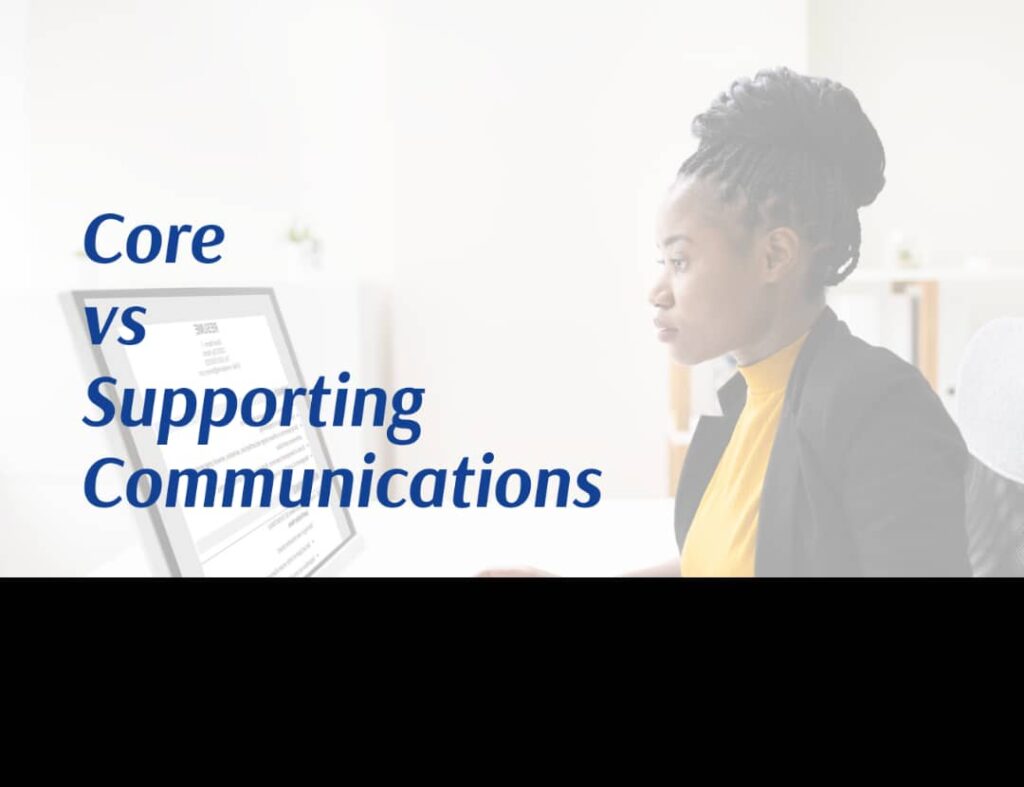Core Communications Vs Supporting Communications

We will begin this article by defining key terms which are interrelated but with distinct and clear meanings that differentiates one from another; skill, knowledge and competencies.
A skill is an ability to do something well. Knowledge for practitioners has to do with the theoretical and practical application of a concept. On the other hand, “competency is a combination of skills, knowledge and behaviours that enables someone to perform a task successfully.” ~Sola Abulu
It is important to note that competencies are relevant in different contexts of communication. For instance, being able to handle communications successfully in the development sector is far apart from being able to handle corporate communications in the energy sector. This is why many intentional hiring managers don’t just look out for people with the skills or experience but pay attention to their desired context.
Skills are widely transferable. What this means is that the communication skills you have working in the finance sector (writing, speaking, etc.) is very useful in the educational or healthcare sector. However, your competencies which include not just skills but knowledge and behaviour may not be useful in another sector.
Core communications:
Core communications is the field that enables targeted information sharing to identified audiences and stakeholder groups in a manner that meets their needs and achieves desired outcomes in terms of perception, awareness, buy-in, behaviour, modification, support, opinion, action or sentiment. The objective of the activities is not just to share information but to influence perceptions, attitudes, beliefs and actions using communication.
Core communications share information to achieve a desired outcome. It also meets the needs of targeted stakeholder groups and achieves a desired objective. All of this is done through communications and messaging only unlike in public relations where information is shared to achieve a desired objective using messages, relationships and behaviour. This article explains the difference between communications and public relations in detail.
In core communications, the professionals involved do not need to have obvious relationships with the people they are communicating with. It involves elements of strategic communications where robust research to understand the target audience or market is carried out and the messaging is purposefully and intentionally tailored to achieve a desired outcome and support the overall business goals. Everything is centred on the messaging and the process of developing the messaging. Where engagement and relationships happen, that can be described as a public relations practice. You can watch this video on the difference between strategic communications and public relations.
Core communications skills includes audience research, stakeholder research and data analysis, creative writing, messaging and content development, subject matter expertise, communications strategy development, communications program delivery, program management, performance management, measurement, traditional and social media management strategy, issues, crisis and stakeholder management strategy.
Professionals with core communications skills focus on the science of language and the psychology of the audience.
Different contexts of communications
- Marketing communications
- Political communications
- Public sector policy communications
- Stakeholder communications
- Development communications
- Health/risk communications
Read our article on strategic communications in the development sector here. You might also want to catch up on the difference between brand and marketing communications here.
Supporting communications:
Highlighting supporting communications skills is important to help you undergo a skill audit and determine what role you occupy as a professional. Professionals in practice with only supporting communications skills are very different from those who have learnt the science and psychology of communications and it is often evident in the outcome of their work. Supporting communications skills includes:
- Program and event management
- Vendor and media partner management
- Campaign implementation
- Creative design
- Visual communications
- Information technology
- Platform management
- Budget and resource management
- Digital and social media account handling
- Digital marketing
- Community management
……………….
Sola Abulu & Associates is a strategy and communications consulting and training firm committed to enabling businesses, brands and organizations to achieve their objectives through strategic communications, organizational effectiveness and reputation risk management
Chat with us for more information on our courses.
